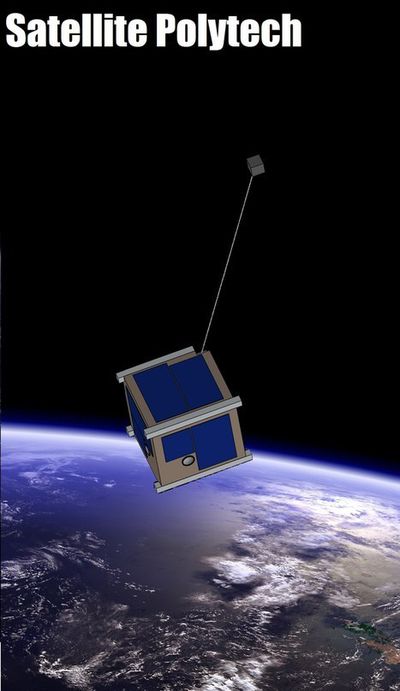Difference between revisions of "Satellite Polytech"
m |
m (→Description) |
||
| Line 5: | Line 5: | ||
=== Description=== | === Description=== | ||
| − | A student design department “Satellite Polytech” is a part of [[SCY]] (Center for scientific and technical creativity of the youth). The main focus of the design department is involving students into the project works, as well as experience and knowledge exchange between the university students, high school students, engineers and researchers. It also aims at creating experimental scientific equipment, machinery and | + | A student design department “Satellite Polytech” is a part of [[SCY]] (Center for scientific and technical creativity of the youth). The main focus of the design department is involving students into the project works, as well as experience and knowledge exchange between the university students, high school students, engineers and researchers. It also aims at creating experimental scientific equipment, machinery and robotics. |
| − | The first project of the design department is creation of a student satellite of a CubeSat type. The project is currently being developed at Peter the Great St. Petersburg Polytechnic University. The design and construction of the | + | The first project of the design department is creation of a student satellite of a CubeSat type. The project is currently being developed at Peter the Great St. Petersburg Polytechnic University. The design and construction of the satellite, as well as the program code development, loads analysis and equipping the satellite with radioelectronic systems is being done by the design department team. Undergraduate, graduate and postgraduate students are involved in the project. Also, high school students participate in it. Satellite will be equipped with a camera that would allow taking panoramic images from space and would be able to transmit the photos to Earth. All the images will be open access. There will also be other equipment on the satellite for performing scientific experiments (details to follow). |
The launch of the satellite is planned to be done with the support of the Russian Federal Space Agency and the Ministry of Education and Science of the Russian Federation. | The launch of the satellite is planned to be done with the support of the Russian Federal Space Agency and the Ministry of Education and Science of the Russian Federation. | ||
| Line 13: | Line 13: | ||
'''The project will contribute toward:''' | '''The project will contribute toward:''' | ||
| − | * | + | * popularization of space science among youth; |
* familiarise university and high school students with space technology; | * familiarise university and high school students with space technology; | ||
* scientific development and student research enhancement; | * scientific development and student research enhancement; | ||
| − | * | + | * promote interest of university and high school students for research in space industry and high-tech. |
===Project goals=== | ===Project goals=== | ||
Revision as of 01:40, 27 May 2016
SCY > Satellite Polytech
Contents
Description
A student design department “Satellite Polytech” is a part of SCY (Center for scientific and technical creativity of the youth). The main focus of the design department is involving students into the project works, as well as experience and knowledge exchange between the university students, high school students, engineers and researchers. It also aims at creating experimental scientific equipment, machinery and robotics.
The first project of the design department is creation of a student satellite of a CubeSat type. The project is currently being developed at Peter the Great St. Petersburg Polytechnic University. The design and construction of the satellite, as well as the program code development, loads analysis and equipping the satellite with radioelectronic systems is being done by the design department team. Undergraduate, graduate and postgraduate students are involved in the project. Also, high school students participate in it. Satellite will be equipped with a camera that would allow taking panoramic images from space and would be able to transmit the photos to Earth. All the images will be open access. There will also be other equipment on the satellite for performing scientific experiments (details to follow).
The launch of the satellite is planned to be done with the support of the Russian Federal Space Agency and the Ministry of Education and Science of the Russian Federation.
The project will contribute toward:
- popularization of space science among youth;
- familiarise university and high school students with space technology;
- scientific development and student research enhancement;
- promote interest of university and high school students for research in space industry and high-tech.
Project goals
1. Development of documentation of the satellite systems;
2. Construction and testing of the systems;
3. Construction of a prototype of «Satellite Polytech»;
4. Testing the satellite in the stratosphere;
5. Modification of the satellite’s systems;
6. Preparation for the launch on the orbit.
The team
- team leader - Murachyov Andrei
- constructor engineer - Maksim Lerman and Aleksandr Kornev
- electrician - Nilan Dzhajyasingxe and Igor Nikolaev
- software engineer (C++) - Maksim Zaxarenkov and Anton Matveev
- radio link - Anna Terskaya and Ilya Rutkovskij
- useful load - Artur Perevalov and Leonid Kulikov
- PR - Polina Fish
Project materials
Literature, articles and useful links
- CubeSat from Nihon University
- Cubesat from Tokyo Institute of Technology Matunaga Laboratory for Space System
- cubesat from Technical University of Denmark
- The Pennsylvania State University. Development and analysis of the thermal design for the osiris-3u cubesat
- Optimized Design of Power Supply for CubeSat at Aalborg University
- Mechanical, Power, and Thermal Subsystem Design for a CubeSat Mission from Worcester polytechnic institute
- Documents from SATLAB Aalborg University Denmark
- Thermal Modeling of Nanosat from San Jose State University
- Cubesat experiment
- Orisus cubesat from the Student Space Programs Laboratory (SSPL) at the Pennsylvania State University
- Compass Cubesat
